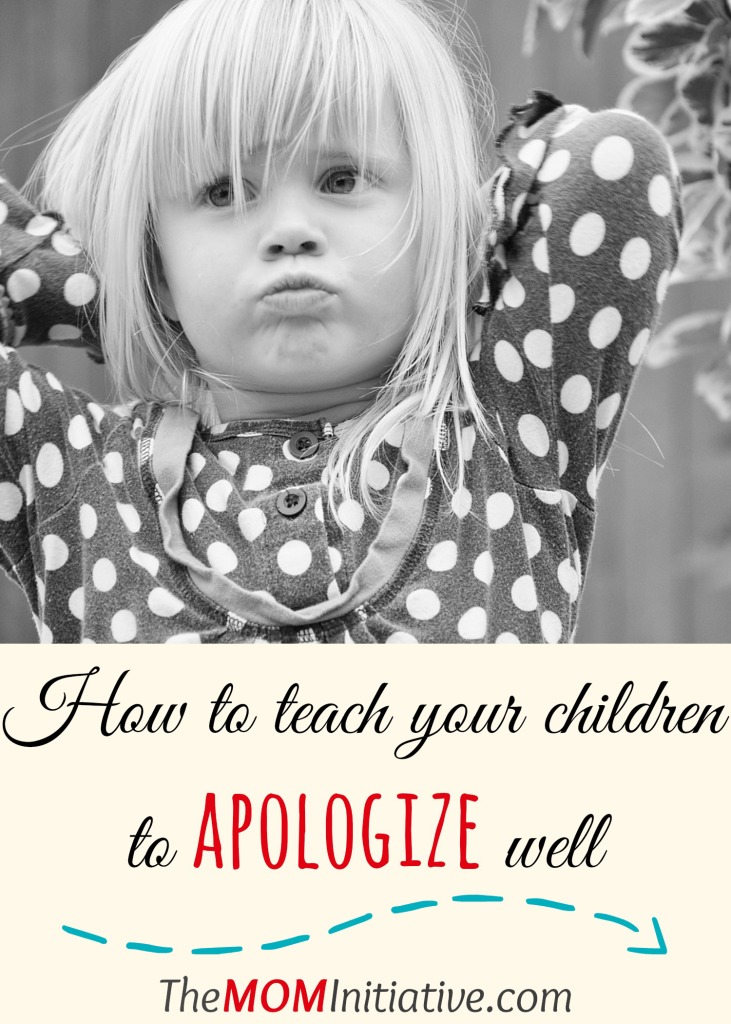Recently I watched my daughter-in-law teaching her little girl to say, “I’m sorry!” It was a heart-wrenching but beautiful thing. She’s only 2, but in many cases, she is already well aware of what is right and wrong.
She understands that saying mean things, talking back to her parents or adults, taking toys away from her friends and lying are all bad behaviors.
The Bible teaches us that we are all born with a conscience (Romans 2:14-15) and so we naturally know some things are just wrong. Understanding the scope and gravity of other behaviors and attitudes comes with time.
That’s why teaching our children to say “I’m sorry” at a young age is so important – even when they aren’t really sorry for what they’ve done. Saying “I’m sorry” not only strengthens their consciences, but also prevents our children from searing them. It may seem so simple, but appologies are important and learning to say “I’m sorry” can build our children’s character in a variety of different ways.
So, let’s look at the benefits of teaching our children to say, “I’m sorry!” even when they don’t feel sorry.
- It teaches them to be humble. “He leads the humble in doing right, teaching them his way.” Psalm 25:9
- It teaches them to care about and respect other people. “Don’t be selfish; don’t try to impress others. Be humble, thinking of others as better than yourselves. Don’t look out only for your own interests, but take an interest in others, too.” Phil 2:3-4
- It teaches them to do the right thing even when they don’t feel it. “So whoever knows the right thing to do and fails to do it, for him it is sin.” James 4:17
- It teaches them right from wrong. “The godly offer good counsel; they teach right from wrong.” Psalm 37:40
- It teaches them accountability for actions. “So then every one of us shall give account of himself to God.” Romans 14:12
- It teaches them to have integrity. “He grants a treasure of common sense to the honest. He is a shield to those who walk with integrity.” Proverbs 2:7
- It helps them understand a small part of repentence. “I preached that they should repent and turn to God and demonstrate their repentance by their deeds.” Acts 26:20
- It teaches them to love others more than they love themselves. “Your love for one another will prove to the world that you are my disciples.” John 13:35
- It teaches them to strive to be peacemakers. “Therefore let us pursue the things which make for peace and the things by which one may edify another.” Romans 14:19
Saying “I’m sorry” isn’t easy, but when we teach our children to say they are sorry even if they don’t mean it, we are teaching them much more than a three word remedy to a bad situation.
So the next time you see your child doing something and you say, “Say you’re sorry!” please know that making them follow through with it even if they don’t mean a word of it is developing character beyond what you could possibly imagine.
Do you struggle with teaching your children to say, “I’m sorry!”? How do you get them to follow through with “I’m sorry!” even when they don’t mean it?
- Ch…ch…ch…CHANGES Are Coming in 2017 for TMI - December 27, 2016
- What New Thing Are You Ready to See God Do in Your Life in 2017? - December 26, 2016
- Heaviness and Newness - December 23, 2016



